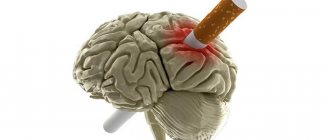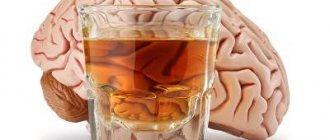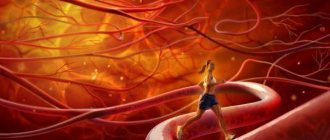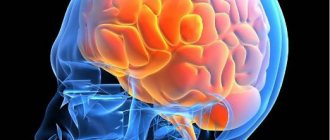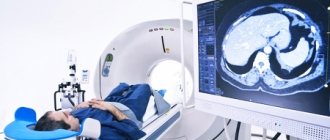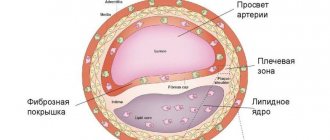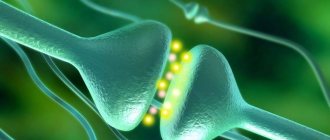The effect of coffee on blood vessels
Scientists have discovered about 500 different substances in coffee. Of these, caffeine is believed to have the most powerful effect on the body. Coffee expands some blood vessels, while others, on the contrary, narrows them. But the drink contains another alkaloid - theobromine, which also affects the walls of blood vessels in a certain way.
Vasodilator effect of coffee
Coffee dilates blood vessels that nourish the heart muscle, kidneys, and skeletal muscles. Thanks to caffeine, the walls of blood vessels relax, resulting in increased blood flow and oxygen supply to the heart.
As a result, performance increases; it’s as if a person gets a second wind.
This effect is often used by fitness club regulars: after a cup of coffee, the intensity of your workout increases.
But caffeine provokes the release of adrenaline into the blood, which contributes to wall tension, narrowing of arterial vessels and increased blood pressure. With a moderate dose of caffeine, vasodilation and constriction in a healthy person are within normal limits. A certain pulsation of the walls of blood vessels occurs, a kind of “charging” that strengthens them.
However, if a person’s body receives 400–600 mg of caffeine (4–7 cups of espresso) during the day, then over time even healthy blood vessels cannot withstand such a load. When caffeine tablets are taken for weight loss, the daily intake of the substance is exactly 600 mg, and after a course lasting several months, a break of at least six months is recommended.
But an avid coffee lover cannot survive six months without his favorite drink! Therefore, there is only one way out: those who want to keep their blood vessels healthy need to ensure that the daily dose of caffeine does not exceed 400 mg.
“Caffeine gymnastics” is quite dangerous for weakened blood vessels affected by atherosclerosis. When brewing coffee, a harmful substance is formed - cafestol, which contributes to the deposition of cholesterol plaques on the walls of blood vessels.
It should also be taken into account that coffee contains a strong antioxidant - chlorogenic acid, which has a beneficial effect on the walls of blood vessels, but if there are a lot of antioxidants, a blood clot may break off. Therefore, the drink should not be abused if you have varicose veins and thrombophlebitis.
The effect of coffee on the blood vessels of the kidneys
Caffeine dilates the blood vessels of the kidneys and increases urination, during which not only waste products, but also calcium are removed from the body. If a person drinks 1–2 cups of coffee a day, but at the same time drinks a lot of water and eats food rich in vitamins, macro- and microelements, then the leaching of calcium does not affect the condition of bones, teeth and hair.
But 40–60 minutes after consumption, the effect of caffeine on the kidney vessels weakens, and under the influence of theobromine they narrow. Sometimes it feels like a slight pain.
Instant coffee contains more theobromine than natural coffee, and accordingly, the load on the kidneys when consuming concentrate increases.
Therefore, in case of kidney diseases, it is recommended to limit the consumption of coffee, especially instant coffee.
Vasoconstriction caused by coffee
Coffee constricts blood vessels in the brain, gastrointestinal tract and pelvis. Dilatation of blood vessels in the brain often causes headaches. Coffee helps the walls of blood vessels return to normal, and the person gets rid of pain.
It is especially useful to drink coffee if the headache occurs due to a long stay in a room with stale air or a smoking room. In such cases, pain signals to the brain that it lacks oxygen.
When caffeine causes blood vessels to constrict, the brain's need for oxygen decreases. Thanks to the antioxidant chlorogenic acid, it is easier for blood vessels to cope with the consequences of inhaling tobacco smoke.
Caffeine is included in many migraine medications.
While relieving pain, coffee simultaneously stimulates the brain centers. After drinking the drink, drowsiness disappears, and it becomes easier for a person to concentrate.
But the process also has a downside: caffeine constricts the blood vessels that supply the eyeball, and the adrenaline released after some time expands them. This is dangerous for glaucoma.
Caffeine relieves menstrual pain, and due to vasoconstriction, the volume of blood discharge decreases. Due to the fact that coffee constricts the blood vessels that nourish the placenta, it is recommended that pregnant women limit or exclude coffee, especially in the first trimester, when all the vital organs of the fetus are just developing and it needs an intensive supply of oxygen.
The healing effects of coffee
Painful conditions for which coffee is beneficial:
- hypotension (drink increases blood pressure);
- low heart rate;
- migraine;
- swelling of the feet (under the influence of caffeine, the kidneys work more intensely, removing excess fluid from the body);
- severe menstrual pain;
- fatigue, drowsiness, inability to concentrate.
If you abuse coffee, compensation mechanisms will develop over time, and the effect of caffeine will begin to wane. To prevent this from happening, you need to allow your body to take a break from your favorite drink 1-2 times a week.
You need to understand that coffee is not a medicine. The drink helps if the feet are swollen due to the fact that a person has been sitting at the computer all day, and the headache is a consequence of the lack of fresh air in the room (for example, when the office is stuffy in winter, but you cannot open the window). However, if such conditions are included in the system, we are talking about a disease, and you should definitely consult a doctor.
Diseases for which coffee is contraindicated:
- high blood pressure (upper – from 140, lower – from 90 mm Hg);
- disruption of blood flow in the vessels of the brain and heart;
- arrhythmia;
- traumatic brain injury;
- glaucoma (increased intraocular pressure);
- aneurysm (pathological dilatation of blood vessels);
- phlebeurysm;
- thrombophlebitis;
- atherosclerosis.
It is recommended to avoid coffee in the first 2 weeks after any heart or vascular surgery. It is also worth reducing the consumption of the drink for people over 70 years of age.
How to reduce the effect of caffeine on blood vessels
Sometimes even those for whom coffee is strictly contraindicated want to enjoy its taste. There are several ways to reduce the effects of caffeine:
- drink decaffeinated coffee. It also contains caffeine, but in tiny doses;
- mix coffee with milk. The method is not controversial, since the drink becomes higher in calories, and milk contributes to constipation;
- snack on citrus coffee: a slice of lemon with sugar or a slice of orange with cinnamon.
Attention! Self-medication may be dangerous, consult your doctor.
Source: https://coffeefan.info/chto-delaet-kofe-s-sosudami.html
Does Coffee Really Dilate Blood Vessels?
Coffee has gained popularity for its exquisite taste, unique aroma and the feeling of cheerfulness that it can give. There is no consensus on how coffee affects blood vessels. Most people believe that the drink increases blood pressure, but this opinion is not entirely true.
It's all about the active substance - caffeine. It is found not only in coffee beans, but also in tea leaves. It is this substance that can have a certain effect on blood vessels. Adherents of the drink are rightfully interested in whether coffee narrows or dilates blood vessels, and whether it increases blood pressure.
Coffee beans contain about 500 chemicals, the most active of which is the alkaloid caffeine. All elements have been studied, and none of them are harmful to the human body.
The effect of coffee on blood vessels is due to the combined effect of all substances. The natural alkaloid caffeine is responsible for most of the processes in the body caused by drinking a portion of the drink.
Caffeine
In medical practice, caffeine is used to stimulate the human nervous system. The belief that it dilates blood vessels is widespread. It must be taken into account that such an impact is ambiguous.
Caffeine dilates blood vessels mainly in skeletal muscles, heart, and kidneys. This action leads to increased heart rate, intense kidney function (increased diuresis) and increased mental ability.
For the same reason, a feeling of vigor arises and excessive drowsiness disappears.
Along with this effect, caffeine constricts the blood vessels of the abdominal region. Thanks to this balanced effect, there is no significant increase in blood pressure.
Coffee, being a source of caffeine, with moderate consumption does not affect the blood pressure of a healthy person.
The effect of caffeine on the human body
The concentration of the biologically active substance caffeine in drinks differs and depends on the variety and production technology of plant raw materials, and the method of preparation. The table shows the approximate amount of active ingredient in various drinks:
| Drink | Portion, ml | caffeine, mg |
| Coffee brewed from ground beans | 237 (1 cup) | 118-179 |
| Soluble | 237 | 76-106 |
| Decaffeinated coffee drink | 237 | 3-5 |
| Black tea | 237 | 43-50 |
| Green tea | 237 | 30 |
Like any other biologically active element, caffeine can be beneficial and harmful. The positive effect on the body is the ability to:
- improve your mood. People of creative specialties feel a surge of strength, inspiration, and a desire to create;
- relieve headache. A cup of strong coffee effectively combats migraine symptoms;
- increase efficiency and concentration;
- stimulate digestion through the production of gastric juice;
- increase blood pressure, which has a beneficial effect on patients with hypotension;
- produce a diuretic effect.
The effect of caffeine on the heart is not confirmed by official medicine. But if a person has heart disease, then a cup of coffee can aggravate the situation by causing heart palpitations. Drinking this drink by a healthy person cannot lead to cardiovascular disease.
If you consume coffee in excessive quantities, you can feel the negative effects of caffeine quite quickly. They appear as follows:
- It is not caffeine itself that gives a person energy; it only helps to use the body’s own resources. For this reason, drinking coffee too often can cause exhaustion;
- stimulation of the production of gastric juice negatively affects the condition of patients with digestive disorders (gastritis, stomach ulcers, cholecystitis);
- hypertensive patients should not drink drinks with a high caffeine content, as they provoke a rise in blood pressure;
- The active substance caffeine can cause addiction and dependence, destroy the walls of blood vessels with varicose veins.
The effect of the drink on the body
The active substance caffeine contained in coffee is an alkaloid! Small doses of it give vigor, but in case of an overdose the opposite effect occurs - inhibition of activity.
It is not advisable to drink coffee before bed. And people with sleep disorders should stop drinking the drink in the afternoon. To understand whether coffee constricts or dilates blood vessels, it is necessary to understand how it affects the human circulatory system.
By relaxing the vascular walls of the arteries, coffee dilates the vessels of the myocardium, kidneys and skeletal muscles.
The vasodilating effect affects organs and systems in a certain way:
- From the cardiovascular system: improves blood circulation of the myocardium, accelerates the impulse at a low heart rate. The impact allows you to develop resistance to physical activity and prevent pain due to stenosis;
- On the part of skeletal muscles: increases blood flow, accelerates the elimination of lactic acid during active physical activity and training, increases the contractility of muscle tissue and restores damaged structures;
- Moderately stimulates the kidneys, causing a diuretic effect, improves blood circulation and promotes the retention of sodium ions;
- From the respiratory system: blood supply to the lung tissue improves and blood oxygen saturation through the alveoli increases.
Brain vessels
Coffee has a positive effect in the fight against headaches. Caffeine is found in some pharmaceutical drugs used to treat migraines.
It is the dilation of blood vessels during migraine that causes an attack of pain due to compression of nerve endings. The action of drugs that contain caffeine is aimed at returning the vessel to normal size.
In addition, the active substance has a moderate analgesic effect.
By increasing the tone of the walls, caffeine somewhat constricts the blood vessels of the brain, making them more active and resilient. This effect stimulates thinking ability and accelerates the functioning of brain structures.
Due to caffeine, the need for oxygen is reduced, and the cortical (and subcortical) centers receive an additional stimulus. Drowsiness decreases or completely disappears.
Constriction of blood vessels in the brain stimulates the production of adrenaline, making it easier for a person to tolerate being in enclosed spaces, which is important for people with claustrophobia.
Caffeine provides temporary immunity to headaches. Sugar added to a coffee drink enhances the effect. Indulging in coffee to relieve headaches can lead to the opposite result: if taken uncontrolled, the pain quickly returns and activity decreases. In addition, the consequence of excessive consumption of a sweet drink can be a sharp jump in blood sugar.
For patients with hypertension, it is important how coffee constricts or dilates blood vessels, and what effect it has on blood pressure. Having a moderate diuretic effect, it helps lower blood pressure.
But there is also a disadvantage to this - the drink can wash away vitamins and important microelements, such as magnesium, with urine.
For people suffering from migraines, this element is very important, and its deficiency can worsen the patient’s condition.
We can conclude that the effect of coffee on the blood vessels of the brain is twofold: it can constrict or dilate blood vessels, depending on the situation.
Some people report headaches on weekend mornings. This is explained simply: on weekdays the body receives a dose of a stimulant - a cup of coffee in the morning, and on weekends this procedure is skipped at the usual time.
Vasoconstrictor effect
Vasoconstriction of the gastrointestinal tract helps stimulate digestion. The benefits are obvious: caffeine helps break down fats and carbohydrates, but the substance slows down intestinal motility.
Coffee constricts blood vessels in the pelvic organs, which leads to a reduction in pain due to inflammation of the bladder. When drinking the drink, women note a decrease in painful symptoms and a decrease in discharge during menstruation.
Having analyzed the mechanisms of action of caffeine, we can note important positive and negative aspects:
| Organs and systems | pros | Minuses |
| Brain vessels | Stimulates activity and thinking ability, prevents spasms. Oxygen transport improves due to blood flow | Causes addiction and anxiety |
| The cardiovascular system | Reduces the risk of disease | Increases blood pressure |
| Gastrointestinal tract | Improves digestion | Slows down the movement of intestinal contents |
| Endocrine system | Reduces the risk of developing diabetes, improves metabolism | Impairs calcium absorption |
| Kidneys | Diuretic effect, reduction of pain in cystitis | Leaching of magnesium and vitamins |
Effect on blood pressure
After consuming caffeine, a healthy person first experiences a slight dilation of smooth muscle vessels and a constriction of brain vessels. This effect does not affect blood pressure.
Blood flow provides good oxygen transport capacity in the circulatory system. Adrenaline stimulates the muscles, causing a surge of energy.
With rational intake of the drink, there is no change in pressure if we are talking about a relatively healthy person who does not have pathological disorders of the cardiovascular system.
If you have heart and vascular diseases, as well as individual intolerance, drinking coffee can cause negative consequences.
Indications and contraindications for drinking coffee
It is useful to drink the drink if you have the following symptoms:
- hypotension;
- rare pulse;
- swelling of the legs of renal etiology;
- migraine;
- painful menstruation;
- intense physical or mental stress;
- drowsiness.
Coffee can bring not only benefits, but also harm. Use is contraindicated in the following cases:
- age up to 12 years and after 75;
- pregnancy (from the second trimester) and lactation period;
- pathologies of blood vessels, heart muscle and brain;
- kidney disease, accompanied by excessive urine output;
- gastric ulcer, colitis, cholecystitis;
- glaucoma;
- atherosclerosis (the ability of a substance to clog the lumen of a vessel);
- varicose veins;
- postoperative period (surgery on the heart, brain, neck, blood vessels).
The daily intake of coffee should not exceed three cups. An overdose is dangerous because the psychostimulant accumulates in the body, which can reduce or increase blood pressure to critical levels.
What else you need to know
Coffee in small quantities is not prohibited for people with high blood pressure. Insomnia sufferers can also treat themselves to a cup of aromatic drink in the morning.
You should not drink coffee while taking aspirin or medications containing caffeine. This may cause an overdose.
Doctors recommend in most cases drinking a drink brewed from ground natural grains.
If you have atherosclerosis, you need to drink instant coffee to avoid cafestol, a substance formed during the brewing process, getting into the drink. The disease is characterized by the accumulation of cholesterol plaques in blood vessels. Cafestol stimulates the production of cholesterol.
For people with VSD, the impact depends on the type of disease. If vegetative-vascular dystonia develops of the hypotonic type, then caffeine helps to increase blood pressure. If blood pressure is within normal limits, then the effect of coffee will be neutral.
It is not recommended to drink coffee if you have varicose veins. The drink quickly constricts blood vessels and leads to a decrease in their elasticity. By increasing blood pressure, strong blood pressure worsens the condition of the venous valve system. To reduce the negative effect of caffeine on blood vessels, it is recommended to drink coffee with milk or cream, as well as dark chocolate.
Source: https://vsepromozg.ru/teoriya/kofe-rasshiryaet-sosudy
Coffee and vessels
The article provides information about the effect of coffee on blood vessels. You will also find out whether doctors allow drinking espresso for varicose veins, what doses of coffee are recommended for healthy people and who should not drink it.
Nowadays there are often people who have problems with the cardiovascular system. After forty years, many people experience pressure surges. If a patient develops hypertension, doctors do not recommend drinking coffee.
At low pressure, espresso can bring a person to his senses. But we will not only talk about pressure indicators and the influence of strong espresso on them; then we will study in detail the topic of coffee and vessels.
Let's find out how coffee affects human blood vessels, and whether it is possible to drink the drink if you have varicose veins.
How does coffee affect the vascular system?
Scientists are still studying the effect of coffee on blood vessels. This topic causes a lot of controversy and disagreement. It’s interesting that coffee lovers drink strong espresso both to dilate and constrict blood vessels. Why is that?
The answer to the question - does coffee dilate or constrict blood vessels is simple. Caffeine has different effects on the human body systems. So, the main active ingredient of the drink has a positive effect on the blood vessels of the human brain when the patient has low blood pressure. Thanks to coffee, the patient gets rid of unbearable headaches.
Migraines occur due to dilation of blood vessels that put pressure on other brain tissue. Pain is caused by nerve endings touched by arteries.
Pharmacy has long known about the positive effect of caffeine on the central nervous system and therefore many dosage forms (citramon, askofen, copacil) contain this component.
Patients with hypotension, in order not to take pills, often replace them with a cup of aromatic espresso. In such cases, coffee constricts blood vessels, and a person feels harmony.
With increased pressure, when the blood vessels narrow, it affects not only the central nervous system, but also the gastrointestinal tract. The process affects the functions of the stomach, pancreas and liver, which may result in vomiting and nausea. Coffee will not help in this case.
If there is no food in the stomach and you drink a cup of espresso, the mucous membranes will be damaged, and over time gastritis, ulcers, etc. will begin to appear. The drink causes an increased production of gastric juice, enzymes for digestion of food and bile.
Coffee is allowed to be drunk only after meals.
Espresso made from natural coffee beans is considered the healthiest. Instant coffee has many impurities and less caffeine.
When is coffee not harmful to health? Acceptable daily dose of drink
Strong aromatic coffee selectively affects different groups of blood vessels and has a different effect on each person. The drink is recommended for people who have no contraindications and have the following symptoms:
- low pressure;
- migraine caused by vascular spasms;
- small pulse;
- swelling of the limbs;
- menstrual pain;
- fatigue, lethargy, drowsiness;
- weakness after physical exercise and hard work.
To maintain good shape, you should not cross the line beyond which caffeine already acts on all body systems like poison. There are approximate dosages that should not be violated. The maximum daily dose is 575 ml of strong espresso. And this norm is not for everyone; for some, two cups of coffee are enough.
Measures are learned experimentally; it is advisable to start drinking espresso with minimal dosages. For experienced coffee drinkers, the effect of the drink on blood vessels is no longer so expressive. Their body has adapted to drinking, so they no longer notice any changes in the functioning of the vascular system.
Try not to drink the drink before bed. It stimulates the nervous system, you can spend the night without sleep.
Drinking coffee for VSD, atherosclerosis
Due to an unhealthy lifestyle and non-compliance with a balanced diet, people develop diseases of the vascular system such as atherosclerosis and vegetative-vascular dystonia.
Over time, arteries and thin vessels accumulate fatty particles on their walls due to eating fast food, fatty meats, sweets, fried foods, etc.
Therefore, already at 35-40 years old, patients experience atherosclerosis. The disease affects the brain, cardiac system, and legs.
Coffee also has a negative effect on such patients; it promotes the formation of cholesterol due to the component that is included in its composition - cafestol.
With vegetative-vascular dystonia, drinking espresso can even be useful when the pathology is manifested by low blood pressure. If the pressure readings are normal, then espresso does not affect its readings at all. Doctors do not recommend drinking grain coffee if VSD is present in hypertensive patients. There are risks of pressure surges and other unpleasant consequences.
An interesting fact: scientists have found that the caffeine contained in teenagers’ favorite drink, Coca-Cola, has the ability to increase blood pressure, but the caffeine in coffee beans does not.
Harm of coffee to blood vessels: who should not drink the drink?
Caffeine can cause irreparable harm if the drink is consumed by patients with the following contraindications:
- diseases of the central nervous system, brain, heart;
- pregnancy, breastfeeding;
- vascular diseases (atherosclerosis, VSD with hypertension);
- gastrointestinal diseases (ulcers, colitis, gastritis);
- kidney pathologies accompanied by excessive urination;
- glaucoma and other eye diseases;
- surgical interventions.
It doesn’t matter if you can’t drink espresso, there are always alternative options. You can replace strong coffee with a weaker drink: cappuccino, latte, or start drinking chicory or tea.
Children under 14 years of age are not allowed to drink strong drinks. Its effects on children and adolescents have not been fully studied.
Coffee for varicose veins
Varicose veins manifest as swollen veins in the lower extremities. Most often, this disease affects women. It is easy to identify it by its appearance. The causes of the disease are:
- Failure to maintain proper diet.
- Liver lesions.
- Spending a long time in a standing position.
- Pregnancy, obesity.
Is it possible to drink coffee if you have varicose veins? - interests many coffee lovers. Especially if a person is used to waking up with a cup of hot espresso. The drink has a bad effect on the condition of the vascular wall. With frequent use, the elasticity of the veins will be impaired, and varicose veins and pathologies of the cardiovascular system may worsen.
Accordingly, you should not drink coffee if you have varicose veins. The disease will progress, nodules will begin to form, the feeling of heaviness in the legs will intensify, and swelling will appear.
Also, espresso in a sick person can cause migraines, arrhythmia, increased blood pressure, and depression. These complications will have to be treated only in a hospital. Take care of your health, if necessary, follow a diet, do not drink illegal drinks.
Source: https://x-coffee.ru/kofe-i-sosudyi/
How does coffee affect the blood vessels of the brain?
Some people cannot imagine the morning without a cup of coffee. This drink energizes, helps to cheer up and improves performance. At the same time, almost no one thinks about how coffee affects the blood vessels of the brain and other vital organs. If used frequently, it can cause serious harm, especially in cases of heart disease.
The mechanism of action of caffeine on the vascular system
The caffeine contained in coffee affects the blood vessels of the brain in different ways. As a rule, it promotes their expansion, but in some systems, for example, digestion and the central nervous system, capillaries contract under its influence.
This is explained by the stimulating effect of the substance: in order for the cardiovascular system and nerve centers to be activated, blood flow in most internal organs is reduced. Reducing the permeability of capillary walls promotes the excitation of neurons in the brain and because of this, drowsiness disappears.
Drinking large amounts of the drink contributes to the accumulation of caffeine in the body. It weakens the effect of adenosine, a substance that inhibits the transmission of nerve impulses. As a result, the brain is activated and ceases to feel the need for rest.
Caffeine stimulates the production of hormones, including adrenaline. Its action is familiar to everyone:
- The pulse quickens;
- Respiration rate increases;
- Pupils dilate;
- I feel a surge of strength.
This hormone stimulates the functioning of the cardiovascular system: the heart begins to contract more often, small vessels narrow, and blood pressure rises. Therefore, coffee and other caffeine-containing drinks are prohibited for myocardial diseases.
The effect of caffeine on blood vessels
The effect of coffee on the blood vessels of the brain is controversial. On the one hand, it activates its work, increases its ability to work, and stimulates brain activity. On the other hand, a strong spasm of small vessels can provoke hemorrhage.
This is explained by the fact that, under the influence of negative factors, the tissue walls wear out over time and become fragile.
Stimulation of nerve centers affects the functioning of the brain:
- The need for oxygen is reduced;
- Metabolic processes take place at an accelerated pace;
- The work of the central nervous system departments improves;
- Drowsiness disappears.
Caffeine significantly affects the functioning of the subcortical structures of the brain, which affects the functioning of the entire body. Under its action, the autonomic nerve centers of the brain stem are activated, which are responsible for breathing, heartbeat, and the endocrine system.
In the absence of serious diseases, it has a positive effect on the functioning of the circulatory system of the brain.
There is an opinion that moderate consumption of coffee reduces the risk of heart attack and angina, due to the fact that in this way the circulatory organs “train”, their resistance to stress increases, and blood circulation is normalized in distant systems.
There is also a dilation of the main vessels - the coronary arteries, through which oxygenated blood flows first to the heart and then to other parts of the body. Accordingly, much more nutrients are delivered to them.
Vasodilation
Coffee has a dilating effect on the supporting blood vessels - arteries. This can be clearly seen in the work of some organs:
- Heart. An increase in heart rate and, accordingly, acceleration of blood pumping through the organ leads to the saturation of its tissues with nutrients. Thus, its resistance to negative influences increases - for the smooth functioning of any muscles, training is needed.
- Muscle. The flow of blood to this body structure helps to strengthen it and speed up the metabolism in its cells. Decay products begin to be intensively removed from the body, and it begins to be intensively cleansed.
- Kidneys. Coffee has a diuretic effect. Blood circulation improves in them, their activity is activated. This normalizes the functioning of the excretory system.
- Lungs. Stimulation of the nerve centers responsible for the functioning of the respiratory organs activates their work. This promotes active saturation of the blood with oxygen. In addition, by taking a deep breath, a person can get rid of congestion in the lower parts of the lungs.
Vasoconstriction
Some blood vessels, on the contrary, narrow under the influence of coffee. For example, under its influence, blood flow in the following organs decreases:
- Gastrointestinal tract. Substances contained in coffee irritate the gastric mucosa. This leads to increased secretion of gastric juice and faster digestion. Caffeine increases intestinal sensitivities.
- Pelvic organs. Due to spasm of the walls of small blood vessels, susceptibility to pain is reduced.
- CNS. In the brain, capillaries narrow. In addition to the positive effect, this can cause nervous exhaustion.
Benefits of caffeine for the brain
Accelerating chemical reactions stimulates the functioning of the brain due to the rapid transmission of nerve impulses between its cells. This contributes to:
- Improving the quality of mental activity;
- Increased blood pressure with hypotension;
- Acceleration of intercellular metabolism;
- Prevention of the development of coronary disease;
- Normalization of hormone secretion by the glands of the brain.
Coffee contains a large amount of antioxidants - substances that prevent tissue oxidation. Aging is inhibited and the risk of tumors is reduced.
Who should avoid drinking coffee?
In large quantities, the drink can be harmful, especially in the presence of certain chronic diseases. Therefore it is contraindicated:
- For diseases of the central nervous system, heart;
- Pregnant and lactating women;
- For diseases of the circulatory system: atherosclerosis, vegetative-vascular dystonia;
- For gastrointestinal diseases: ulcers, gastritis;
- For pathologies of the urinary system;
- For eye diseases: glaucoma.
The effects of caffeine on the body are poorly understood. Do not give strong drink to children under 14 years of age.
How much is coffee without harm?
When it comes to coffee, benefits and harms go hand in hand. Its consumption in large quantities can cause exacerbation of chronic diseases and provoke problems with the circulatory system and internal organs. Therefore, experts recommend that a healthy person drink no more than 4 cups a day.
Some rules for drinking the drink will help reduce the negative effects of caffeine:
- Avoid its use if you have heart disease;
- Give preference to a quality product: instead of instant coffee, brew ground coffee;
- You should not drink it on an empty stomach.
After a cup of coffee you feel a surge of strength and vigor. But you shouldn’t get carried away with it: excessive consumption leads to physical and nervous exhaustion.
Source: https://GolovaiMozg.ru/interesnye-fakty/kak-kofe-vliyaet-na-sosudy-golovnogo-mozga
When is coffee not harmful to health? Acceptable daily dose of drink
A caffeinated drink is healthy, but everything is good in moderation. An uncontrolled amount of coffee drunk provokes problems with the vascular system and internal organs. For each person there is an individual dose of drinking a hot drink. On average, it is recommended to drink no more than 4 cups per day.
Advice! If it is impossible to give up coffee, then it is better to buy coffee beans in vacuum packaging, which completely preserves the tart aroma.
To reduce the impact of coffee on blood vessels, you should adhere to certain conditions:
- Drink the drink in an amount not exceeding 350-400 ml. Add milk or fresh cream to each subsequent dose.
- Give preference to ground coffee over instant coffee.
- Drink caffeinated drinks only after meals.
- Drink coffee with caution if you have heart disease.
For some, one cup a day is enough, but some coffee lovers do not limit themselves to even 4. It all depends on the person’s well-being and the system’s reactions to caffeine. With constant “wear and tear” the body becomes physically and nervously exhausted.
The effect of coffee on blood vessels is due not only to a person’s predisposition to certain diseases. More often, it is the individual characteristics of the body that allow you to consume large amounts of caffeine without visible harm to health. Addiction is the most harmless consequence of overusing caffeine-containing drinks. The best solution would be the “golden mean” - making a couple of cups of aromatic coffee a day.
The terrible truth about coffee Is coffee good or bad? Caffeine and health Scientists have found out whether you should drink coffee in the morning. The answer will surprise you!
The effects of coffee on blood vessels and the body's reaction
Coffee is one of the most commonly consumed drinks. According to statistics, every third person on the planet drinks it constantly or from time to time.
Coffee brings many substances into the body, so it affects metabolism and organ function. And the cardiovascular system is no exception.
The effect of coffee on blood vessels and the heart is beyond doubt because it contains the stimulant alkaloid caffeine.
Beneficial effects of caffeine on blood vessels
Caffeine acts as a dope on the body because it is part of the methixanthim group. It minimizes the feeling of fatigue, increases endurance, activates brain performance and physical activity. When drinking coffee in acceptable quantities (2-4 cups per day), breathing quickens, blood circulation increases and the functioning of the cardiovascular system changes.
When asked whether coffee dilates or constricts blood vessels, the answer is ambiguous. It all depends not only on the composition of the coffee, but also on the type of vessels. It is able to dilate blood vessels:
- Cardiac muscle: blood circulation improves and nutrients and oxygen enter the muscle.
- Skeletal muscles. With increased blood flow, they become stronger.
- Kidney. Acts on the excretory organs, accelerating the excretion of breakdown products, water, uric acid.
- Lungs. The capillaries in the alveoli are actively enriched with oxygen, which prevents hypoxia.
Under the influence of coffee, blood vessels narrow into:
- Gastrointestinal tract. The secretion of gastric juice increases and digestion improves. There is an active breakdown of the main components of food.
- Pelvic organs. Can relieve or reduce pain from cystitis, urethritis and other diseases in this area.
- The brain. Acts as an antispasmodic, relieving discomfort during spasms.
Studies conducted in 2020 (source: PubMed, Embase, CINAHL, Cochrane Database of Systematic Reviews, and screening of references.) looked at the effect of coffee on vascular health. Two groups of people were studied: coffee lovers and coffee opponents. According to scientists, drinking coffee is beneficial for a number of reasons:
- heart and vascular diseases are reduced by 15%;
- the likelihood of avoiding a stroke increases by 30%;
- the risk of cardiovascular pathologies is reduced by 19%.
This effect is due to the presence of polyphenols in coffee, so moderate consumption of the drink brings undeniable benefits. It helps the body function when consumed in moderation.
Long-term observations have proven what makes coffee healthy:
- One cup contains 29% of the daily requirement of vitamin P, which makes vascular walls elastic and capillaries strong.
- Under the influence of caffeine, the aorta expands. The activity of the myocardium (heart muscle) increases, especially during physical activity.
- The alkaloid acts as a conductor of nerve impulses to the heart muscle, which is important for bradycardia and slow heart rate.
- The drink is useful for atherosclerosis: it improves blood supply to areas with poor patency. It is advisable to use it diluted by adding milk or cream.
- Antioxidants act on oxidation products, preventing the development of heart failure.
- It has a positive effect on low blood pressure, leveling it, therefore it is useful for hypotensive patients.
- Caffeine relieves migraine attacks that occur due to the expansion of vascular lumens. Nearby tissues and nerve endings experience pressure, which leads to pain. Coffee helps narrow blood vessels and can replace medications for migraines.
Mechanism of action of caffeine
What does coffee do to blood vessels when Caffeine enters the bloodstream:
- blocks an enzyme that affects the energy source in muscle fibers;
- reduces the sensitivity of receptors in the nervous system;
- reduces the effect of metabolites on vascular walls.
As a result of this action, energy and calcium ions necessary for muscle contraction accumulate in the muscles. The effect of caffeine on blood vessels causes them to sharply narrow. The speed of blood movement through the narrowed lumens decreases, so the heart muscle starves for a short time.
The work of the smooth muscles of the vascular walls, which shrink, is also disrupted. This leads to headaches, paleness of the extremities, and possible partial loss of coordination of movement. Then the lumen expands and the “living motor” works faster: the frequency of its contractions increases.
The effect of coffee on the blood vessels of the brain has been noted. When the lumen of the cerebral arteries decreases, the blood moves slowly and glucose stops flowing to the neurons. This leads to starvation of nerve tissue.
This effect occurs gradually and by the evening the person experiences poor attention, absent-mindedness, and drowsiness. The nervous system experiences exhaustion.
Knowing how coffee affects the capillaries and blood vessels of the brain, you should not drink your favorite drink uncontrollably throughout the day.
Negative aspects of the effect on blood vessels
If a person is healthy, then the question of how coffee acts on blood vessels is not relevant for them. When the heart works like a motor and there are no cardiovascular pathologies, then a couple of cups of a tasty drink will not cause harm.
When consumed in large doses, caffeine affects all blood vessels, narrowing them. Blood pressure rises and general health worsens. Some people claim that drinking the drink affects the heart muscle. There is a feeling of heaviness in the heart area, headaches, dizziness develop, and panic attacks occur. If a person is unwell, then such phenomena are quite possible.
In case of cardiovascular pathologies, coffee has a negative effect on the body and can lead to serious problems:
- The intake of caffeine increases vegetative-vascular dystonia (a disturbance in the functioning of the autonomic nervous system), causing feelings of restlessness and anxiety.
- Coffee causes an increase in blood pressure, which is dangerous for hypertensive patients.
- After drinking the coffee “elixir,” a number of elements useful for the functioning of the heart muscle are washed out of the body: potassium, calcium, magnesium. A person who does not limit himself to drinking coffee may experience heaviness or pain in the myocardium.
- For angina and tachycardia, a stimulating drink worsens the patient's condition.
Coffee blood vessels dilate or contract
To understand the effect of coffee on the blood vessels of the brain, you need to understand how it affects the cardiovascular system as a whole.
The drink has a vasodilating effect on the following organs:
- heart. At the same time, blood circulation improves, more oxygen and nutrients enter the organ. In case of blockage of blood vessels, blood flow in problem areas accelerates. Increases resistance to external stimuli;
- skeletal muscles. With the help of caffeine, blood flow increases and the corset becomes stronger. Lactic acid is removed from the body faster. True, with abuse, the vascular lumens narrow and spasm occurs;
- kidneys Coffee dilates blood vessels in these organs and thereby improves blood circulation. The urinary system begins to function faster. Sodium ions are retained in tissues;
- lungs. The expansion of capillaries promotes active blood supply to tissues. Oxygen enrichment occurs faster. In this way, hypoxia can be prevented.
Constricting action
Not in all cases, caffeine dilates blood vessels. When the alkaloid penetrates the bloodstream in the following organs, a vasoconstrictor effect is noted:
- Gastrointestinal tract. Secretion increases, more gastric juice is released. Thanks to this, digestion improves. The breakdown of carbohydrates and fats occurs at an accelerated rate;
- pelvic organs. Due to the fact that coffee constricts blood vessels, it is possible to reduce pain in urethritis, cystitis and a number of other pathologies. Moderate consumption of the drink can reduce the severity of discomfort during cramps;
- brain. A vasoconstrictor effect is also noted. True, if you abuse coffee drinks, exhaustion is possible.


